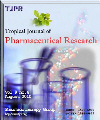
|
Tropical Journal of Pharmaceutical Research
Pharmacotherapy Group, Faculty of Pharmacy, University of Benin, Benin City, Nigeria
ISSN: 1596-5996
EISSN: 1596-5996
Vol. 14, No. 7, 2015, pp. 1145-1152
|
 Bioline Code: pr15150
Bioline Code: pr15150
Full paper language: English
Document type: Research Article
Document available free of charge
|
|
|
Tropical Journal of Pharmaceutical Research, Vol. 14, No. 7, 2015, pp. 1145-1152
| en |
Effect of Reprocessing and Excipient Characteristics on Ibuprofen Tablet Properties
Rojas, John; Zuluaga, Carlos & Cadavid, Andrés
Abstract
Purpose: To determine excipient and ibuprofen:excipient mixture sensitivity to reprocessing produced
by either direct compression or wet granulation.
Methods: The effect of excipient type, technology and reprocessing on flow, compressibility and
compactibility was assessed using and 8x2x2 factorial design. Design Expert® v.8.01 software was
employed for data analysis. Pure excipients were processed by direct compression, while the
ibuprofen:excipient mixtures were processed by wet granulation. Once compacts were produced, they
were milled and reprocessed using the same technologies, respectively. Excipient properties such as
particle size, porosity and densities were also evaluated.
Results: For most excipients, reprocessing caused a 20 – 50 % decrease in particle size and 5 – 80 %
reduction in porosity, but increased compactibility (10 – 50 %). Flow decreased (30 – 50 %) only for
highly densified excipients such as calcium carbonate and calcium diphosphate.
Conclusion: Microcrystalline cellulose and sorbitol are the excipients with the best tableting properties
when reprocessing is conducted via wet granulation and direct compression platforms, respectively.
Keywords
Reprocessing; Excipient; Microcrystalline cellulose; Sorbitol Direct compression; Wet granulation; Ibuprofen
|
| |
© Copyright 2015 - Tropical Journal of Pharmaceutical Research
Alternative site location: http://www.tjpr.org
|
|
